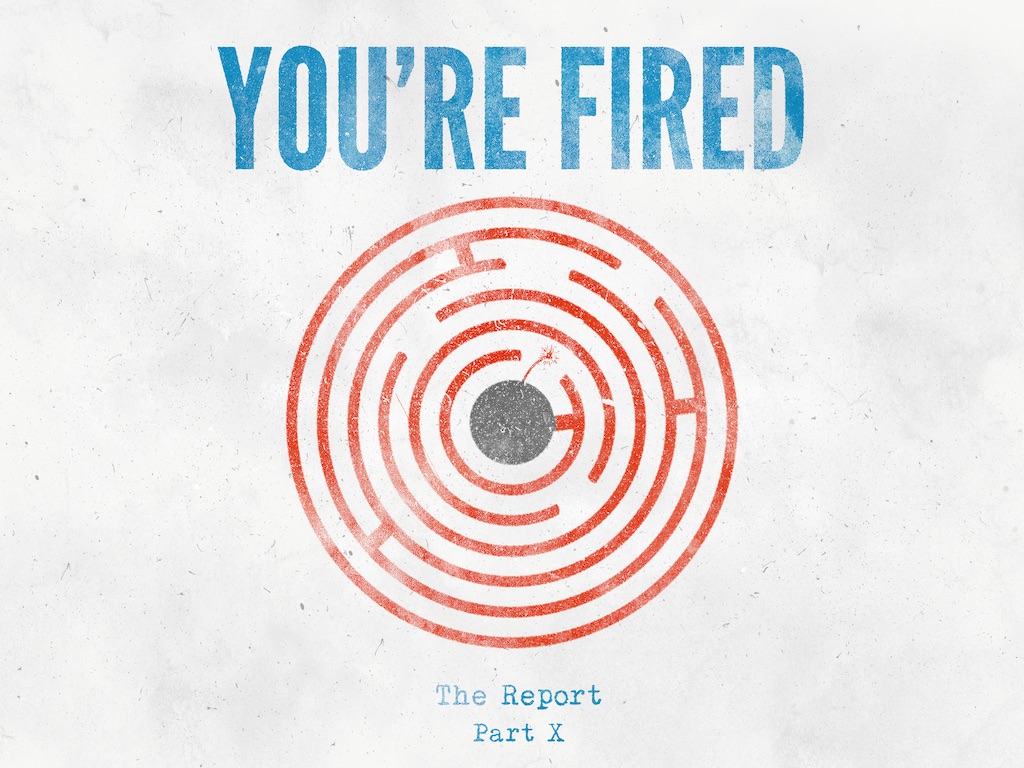The Report, Episode Ten: You're Fired
Today, we released the tenth episode of Lawfare’s narrative audio documentary, The Report, which recounts the story Robert Mueller lays out in his 448-page report. This episode covers Attorney General Jeff Sessions’s decision to recuse from the Russia investigation and the sudden firing of FBI Director James Comey.

Published by The Lawfare Institute
in Cooperation With

Today, we released the tenth episode of Lawfare’s narrative audio documentary, The Report, which recounts the story Robert Mueller lays out in his 448-page report.
This episode covers Attorney General Jeff Sessions’s decision to recuse from the Russia investigation and President Trump’s reaction. It also details the sudden firing of FBI Director James Comey. Mueller evaluates whether these episodes, individually or collectively, meet the legal requirements of obstruction of justice.
The first seven episodes of The Report unpack Volume I; they tell the story of Russia’s efforts to interfere with the 2016 presidential election and the Trump campaign’s interaction and involvement with those efforts. Episode 1 covers the Russian social media operation and the activities of the Internet Research Agency. Episode 2 focuses on the Russian hacking campaign; the stealing of documents and emails from the Democratic National Committee, Democratic Congressional Campaign Committee and figures associated with the Clinton campaign; and the leaks of stolen materials timed to affect the U.S. election. Episode 3 covers the Trump campaign’s involvement in the distribution of hacked materials. Episode 4 tells the story of Trump Tower Moscow, which Donald Trump sought to build even as he was denying having any business in Russia, and Trump Tower New York, where Russian representatives showed up promising “dirt” on Hillary Clinton. Episode 5 recounts the stories of three men associated with the Trump campaign and their various ties to Russia: George Papadopoulos, Carter Page and Paul Manafort. Episode 6 details backchannel attempts by the Russians to influence the Trump campaign and transition on policy matters—an effort to reboot U.S.-Russia relations one secret meeting at a time. Episode 7 covers the special counsel’s charging decisions—which individuals Mueller decides to prosecute, whose prosecutions he declines, and the reasons for his decisions.
We turned to Volume II in Episode 8, which offers the necessary legal and factual context to understand this second half of the report on possibly obstructive activity: Why was President Trump nervous about an investigation into his campaign's contacts with Russia? What is obstruction of justice? And Episode 9 details national security adviser Flynn’s lie to federal investigators about his phone call with the Russian ambassador and the White House response to learning of that lie. Episode 9 also charts the president’s turbulent relationship with Comey, which led the two men to a fateful Oval Office encounter.
In this episode, we tell the story of two senior Justice Department officials who can’t seem to please the president: Sessions and Comey. It maps how Sessions comes to recuse himself from the Russia investigation and how that decision renders him useless for the president’s purposes. And then Trump decides to fire the FBI director. How did White House aides scramble to craft justifications for the dismissal that weren’t related to Russia and why is it that the Deputy Attorney General provided the pretext for the firing? And what does it mean when Trump undercuts their efforts and acknowledges the real reasons for the firing in a television interview? This all leaves the special counsel to untangle how the lies and mixed motives implicate obstruction laws and the president’s unique constitutional role.
This episode features Matt Zapotosky, Mike Schmidt, Preet Bahara, Joshua Campbell, Greg Miller and Jack Goldsmith.
Understanding the Mueller Report has never been more important. President Trump is facing new allegations that he is soliciting foreign interference in the 2020 election, which has prompted an impeachment inquiry in the president’s activities. And this week, reports have emerged that Attorney General Bill Barr is asking foreign governments to help discredit the investigation into Russian interference in the 2016 election. To understand what is happening now, it is critical to know what Mueller says happened before. We hope you’ll continue to subscribe, rate and share it widely.
We are grateful to the William and Flora Hewlett Foundation and the Democracy Fund for their support for this project. If you want to support work of this type at Lawfare, please consider becoming a monthly donor by clicking here:






